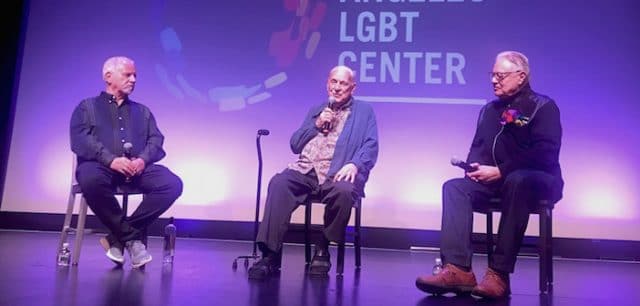
Author and activist Felice Picano was there.
“It was a hot night, a full moon, and a lot of people were out and around,” Picano recalled. “I met a guy who was a bartender. We walked out the door about 2 a.m. to go home together and there’s this riot going. I looked at him, he looked at me and I said, ‘Let’s go join the riot!’”
Picano and his new friend were among those involved in what became known as the Stonewall Riots, a series of spontaneous, violent demonstrations by members of the LGBT community at the Stonewall Inn in New York City’s West Greenwich Village on June 28, 1969.
The riots, considered the flashpoint that help launch the modern-day LGBT movement, were remembered by Picano and others during Pride Open House: A Stonewall Conversation presented by the Los Angeles LGBT Center in June, the 50th anniversary of Stonewall. The panel followed a special screening of the acclaimed PBS documentary Stonewall Uprising at the Center’s Renberg Theatre.
Robert M. Clement, now 94, shared with the audience that he was walking with his partner, John Noble, that night to their West Village apartment. They heard a ruckus and Noble went to investigate.
“John came back as said a bunch of gays were doing high kicks at the police, and I thought, ‘I don’t think I’m interested in that,’” Clement said. “So we kept moving.”
He may not have thrown any rocks that night, but the riots helped bring Clement’s activism to a new level. The ordained priest had founded the Church of the Beloved Disciple in Manhattan a year earlier, the first major apostolic and sacramental church for the LGBTQ community in New York.
“When I realized what Stonewall was, within two days, it changed life forever,” he said. “I remember saying ‘I feel free.’ Free at last. I’m free to be myself. I’m never turning back.”
The riots also spurred on a lifetime of activism for panel moderator Dr. Frank Galassi, who became a regular patron at Stonewall Inn while completing his graduate studies at New York University.
“I wanted to get away from the stuffy academic world. Dancing at Stonewall, I could be my authentic self,” he said. “It was incredible and exciting; an extraordinary experience.”
For Clement, the full impact of the Stonewall Riots came a year later at the first-ever New York City Pride March, which took place on the first anniversary of the riots. Up until then, he had only met other gay people in relatively small numbers.
“I got to the corner of 10th and Christopher streets and I saw thousands of people stretching from as far as I could see,” Clement recalled. “Can you imagine what that meant a year after Stonewall and after spending one’s life in the background? I knew then that there were a lot of us and, now, we were a community.”







